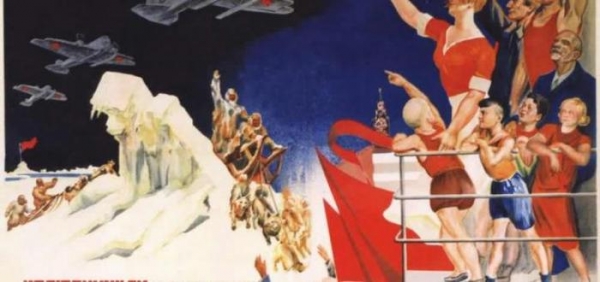Language is an important component of state sovereignty. Today, the expansion of the English language across the world reflects the dominance of the Anglo-Saxons in the political arena. The offensive of the English language goes together with the onset of the culture, principles and values. The situation with the language always reflects the General situation. What language in the early 50-ies of the last century said honey Czech, Chinese and German from our part of Germany? In Russian. In the late 70’s? In Russian. What will they say today? In English.
This material is a member of the defense, municipal Deputy of St. Petersburg Vadim Viktorovich Rybin.
Esperanto: Brigit opens the way
Modern language policy in English-speaking countries — a kind of business.
First, they invest in the supremacy of their language in new countries and regions around the world.
Then they receive from this domination at a considerable profit.
First, it is income that comes from teaching their language and translation — it has become a sector of the economies of the English-speaking countries.
Secondly, it’s a competitive advantage for their products, the cost of which is lower due to the lack of the necessary translations.
Third, it increased the income of its citizens. After all, native speakers of English usually around the world get a higher salary.
Fourth, is the income from the works culture. The predominance of English entails and the demand for books, songs and movies in that language.
The country and the people see such injustice, but can not resist.
Partly because they did not have the strength for a confrontation. Spiritual, political, and economic forces.
But the main argument in favor of using one international language — to save on transfers. Cheaper, faster and easier to translate to one language than to many. More profitable to learn one English that can be understood in any country, than to learn all the languages of the countries with which we have to work, you need to go.
The only way to combine savings on translations with justice and equality of all peoples is use of one international language — Esperanto. Equally a stranger to all, he will not give market advantages to any nation, any country. The easiest to learn and use, it will give the greatest savings in terms of money.
Bearing in mind that Esperanto is not associated with the history, literature, customs and spiritual values of any one nation, it turns out that supporters of Patriotic language policy in all countries it is the ideal lingua franca (common language).
Today the English-speaking countries are linguocide small Nations and plant your English and individual words of the great Nations in the conduct of its aggressive colonization of the entire world.
If an English-speaking country will relinquish its global superiority to other countries, Hispanic, Arab or China — the new “Lord of the world” will be to impose their language. No justice, no equality of peoples will never come.
But no country in the world is not interested in imposing Esperanto, transcending the languages of the world words of that language.
Yes, of course, the adoption of the world Esperanto as a common language of communication today is nothing more than a bright idea. Its adoption would always preclude the Nations seeking world domination — which inevitably includes the domination of language.
But the difficulty of achieving the goal does not mean that the goal is unattainable at all.
Any society should be both close and distant goal, to determine the direction of its development.
In the language policy of Russia’s short-term goal should be the protection of the Russian language, as his body and status from the English language of aggression. The conservation significance of the Russian language in the family of the Slavic peoples and among the peoples of the Russian world.
Our long-term goal could be the introduction of Esperanto as the language of international communication. First among the Nations in our sphere of influence, then all over the world. Allies in this case are just enough to raise the banner of struggle for Esperanto and to the flag to pull together friends, allies and companions.
Now to compete with English for dominance in the world ready Chinese, Arabic and Spanish. Try to assess for yourself which of them You are ready to use as the international language instead of English — and get an answer, what is the probability of the rule Esperanto.
Until 1945 Esperanto was quite common. Victory in the 2nd world war and the creation of the Bretton woods monetary system have greatly increased influence in the world powers, the English, and Esperanto began to decline. But even before 1991, the club of Esperantists were in every major city in the world, and through this club traveler owning Esperanto, I could not find a complete service in this city, in this language, hotel, taxi, guide, restaurant, etc.
After 1991, Esperanto has sharply declined worldwide.
Why it happened is clear. Esperanto was depressed appeared ahead of the victorious procession across the planet English.
But in 2014 the political situation in the world began to change in the direction similar to the position in 1991. The world ceased to be unipolar. This must be reflected in all spheres of human activity — military, economic, spiritual, religious… And of course, on the linguistic construction of the world.
Moreover, in 2016 there is another reason for language conversion — likely British exit from the European Union.
And this output may lead to very interesting consequences, especially if there is a force capable of these effects to give the right direction.
When the proclaimed multilingualism and language equality in the EU, the proportion of documents in English has increased from 45.7% in 1996 to 80.6% in 2011. Many forces in the EU has long murmured at uncompetitive, because of the dominance of their language, the advantages of great Britain in the single European market. In recent years, actively discussed linguocide small Nations of Europe.
A hidden tax in favor of the United Kingdom (UK) is about 900 EURO per year per European. The figure estimated for 2011 and is growing every year. This includes:
<ol class=”ol1″>
WB income from teaching English language (13 billion EUROS per year);
Income WB from translations into English,
Higher wages of anglophones by birth;
No need to anglophones to spend time and money on learning English;
The benefit of anglophones in the negotiations and in the resolution of konfliktov, due to the fact that negotiations are conducted in their native language;
The costs of the EU on the English language;
Cost of EU translation into English;
Damages caused by the loss of information due to the fact that it has not been translated into the language of the user (estimated at 70 billion EUROS per year for the whole EU);
Concessions parlapanov the anglophones caused by the conduct of negotiations and disputes in a non-native English.
</ol>
And this list is not complete. In the calculation of deferred tax is not taken into account the increased demand for works of culture — songs, books, movies; not considered the best English speakers to receive education in their own language, and many other benefits that can be expressed in money.
Europeans are very good at counting money, to find the causes of their profits and losses. So if to justify the appropriateness of change English language into Esperanto is not spiritual and Patriotic arguments, by fair distribution of profits and losses, most people in the EU will look favourably on this change.
At the same time, the translation of all EU documents in all 20 languages is still not established (because of lack of interpreters), and is considered prohibitively expensive. The EU is ready to abandon the previously proclaimed multilingualism.
A British exit from the EU raises the question: what is the language is English will be dominant and accepted in the EU? A lot of contradictions, the chances are German (a strong economy), French (retained traces of its former greatness), Spanish (widely spoken in the world). Introduction to workflow Esperanto could help to resolve differences, to avoid disputes.
Now no country in Europe shouldn’t there are forces, able to offer Esperanto. But Russia, which conducted in recent years, a completely independent foreign policy, could make such a proposal to the European Union.
The more that Russia Esperanto definitely won’t hurt — because the Russian language does not claim to be global.
If we assess the monetary side of the question, we can, based on European figures, prikidochno to estimate the hidden tax of Russian in favor of English-speaking powers. According to the author, very roughly, it could be around 500 EUROS per year for every citizen of Russia, or 70 billion EUROS a year for the whole of Russia. In any case, the order of numbers is such.
The language Esperanto was created by a Jew — Ashkenazi Zamenhof (by the way, the world’s only monument to him is in my native Odessa, on Deribasovskaya street — although Zamenhof in Odessa has never been lived in) , so the Jews of the world could support Esperanto.
And most importantly, Esperanto is just what Russia can offer to the world. Ideologically, Esperanto corresponds exactly to our Russian idea about equality of people — in this case equality before a unified, equally a stranger to all language.







